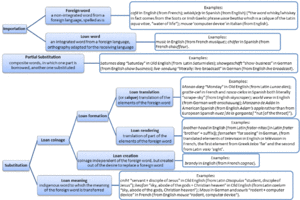Loanword facts for kids
A loanword is a word that one language adopts from another. It's like a language "borrowing" a word and making it its own. For example, the English word "jungle" originally comes from the Hindi language.
Contents
What are Loanwords?
Languages are always changing and growing. One way they grow is by taking words from other languages. These words are called loanwords. When a word is borrowed, it becomes a regular part of the new language. It's not like borrowing a book that you have to return!
Many English words are loanwords. English has borrowed words from French, Latin, Greek, Spanish, and many other languages. This makes English a very rich language with a huge vocabulary.
Why Do Languages Borrow Words?
Languages borrow words for many reasons. It often happens when different cultures meet. This could be through trade, travel, or even war.
- New Things or Ideas: Sometimes, a new invention, food, or concept comes from another country. The name for that new thing often comes with it. Think about "pizza" from Italian or "sushi" from Japanese. These foods were new to English speakers, so their names were borrowed too.
- Prestige or Fashion: Words can also be borrowed because they sound cool or come from a language that is seen as important. For a long time, French was a very fancy language. Many English words related to cooking, fashion, and art came from French, like "ballet" or "cuisine."
- Filling Gaps: Sometimes, a language might not have a perfect word for something. Borrowing a word from another language can fill that gap. It might be a word that describes something very specific.
- Simplicity: A foreign word might be shorter or easier to say than a long phrase in the native language.
How Loanwords Change
When a word is borrowed, it often changes a bit. It might change in how it sounds or how it's spelled.
- Pronunciation: The way a loanword is said usually changes to fit the sounds of the new language. For example, the French word "croissant" is pronounced differently in English than in French.
- Spelling: The spelling might also change to match the rules of the new language. Sometimes, the original spelling is kept, but it's pronounced differently.
- Meaning: Sometimes, the meaning of a loanword can change slightly. It might become more general or more specific than its original meaning.
Examples of Loanwords in English
English has borrowed words from all over the world. Here are just a few examples:
- From French: "Restaurant," "menu," "ballet," "chocolate," "denim."
- From Spanish: "Tornado," "patio," "canyon," "mosquito," "siesta."
- From German: "Kindergarten," "delicatessen," "hamburger," "angst."
- From Japanese: "Karaoke," "sushi," "tsunami," "tycoon."
- From Italian: "Pizza," "spaghetti," "opera," "umbrella."
- From Arabic: "Algebra," "coffee," "sugar," "sofa."
These examples show how languages are always connected. They share words and ideas, which helps cultures understand each other better.
Images for kids
See also
 In Spanish: Préstamo lingüístico para niños
In Spanish: Préstamo lingüístico para niños




